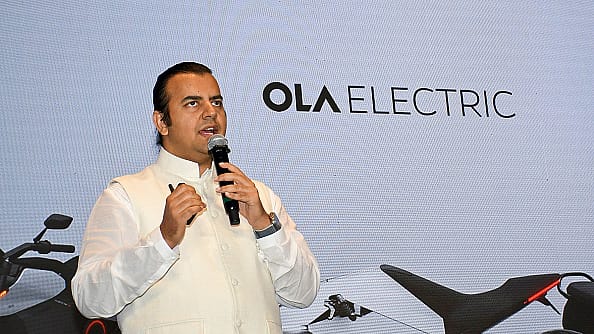Ola’s Bhavish Aggarwal backs Piyush Goyal’s critique of Indian startups
ADVERTISEMENT

Bhavish Aggarwal, the founder of Ola Electric and artificial intelligence (AI) startup Krutrim, backed Union commerce and industry minister Piyush Goyal’s sharp critique of India’s startup ecosystem, saying the country’s startup community needs to introspect as to why it is building just consumer tech companies.
“Fully agree with Minister @PiyushGoyal statement. Our startup community needs to introspect as to why we’re just building consumer tech companies. Entrepreneurs need to reflect and instead of building lifestyle apps, build innovation and future tech. Rockets, AI drugs, EUV machines, new mineral refining tech, new materials etc so much to build!”Aggarwal said in a post on X.
To be clear, Aggarwal’s first startup, ride-hailing firm Ola Cabs (now Ola Consumer), was a consumer internet company before he ventured into electric two-wheelers and battery cell manufacturing.
At Startup Mahakumbh 2025, Goyal slammed Indian startups for focussing on food delivery apps, turning unemployed youth into cheap labour so that rich can get their meals without moving out of their house. Talking about innovations done by China's startups, Goyal said Chinese new-age companies are dominating the electric mobility ecosystem. “Are we going to be happy being delivery boys and girls?” asked Goyal.
“I know at least 3 or 4 billionaires whose children make fancy ice creams (vegan or gluten-free) and cookies and run a very successful business. I have no complaints against that. Is that the destiny of India?” he asked, adding that this is business but nor entrepreneurship. “Other countries are investing in semiconductor chips and AI models. Do Indian startups want to make only ice creams or chips?”
Goyal urged investors and Shark Tank judges to change their perspective. On instant grocery delivery apps like Blinkit, Zepto and Instamart, Goyal said the resources are going only to hyper-fast logistics while China is developing robotics, machine learning, and 3-D manufacturing.
Commenting on Goyal’s remarks, former Shark Tank judge and ousted BharatPe founder Ashneer Grover said the only people in India who need a “reality check” are its politicians. “Everyone else is living in the absolute reality of India. China also had food delivery first and then evolved to deep tech. It’s great to aspire for what they’ve done - maybe time for politicians to aspire for 10%+ economic growth rate for 20 years flat before chiding today’s job creators,” he said.
Aadit Palicha, co-founder of Zepto, responded to Goyal’s criticism of Indian startups on X. “It is easy to criticise consumer internet startups in India, especially when you compare them to the deep technical excellence being built in US/China. Using our example, the reality is this: there are almost 1.5 Lakh real people who are earning livelihoods on Zepto today - a company that did not exist 3.5 years ago. ₹1,000+ Crores of tax contribution to the government per year, over a billion dollars of FDI brought into the country and hundreds of crores invested in organizing India's backend supply chains (especially for fresh fruits and vegetables). If that isn't a miracle in Indian innovation, I honestly don't know what is,” he said.
“Why doesn't India have its own large-scale foundational AI model? It's because we still haven't built great internet companies. Most technology-led innovation over the past 2 decades has originated from consumer internet companies. Who scaled cloud computing? Amazon (originally a consumer internet company). Who are the big players in AI today? Facebook, Google, Alibaba, Tencent etc. (all started as consumer internet companies). Consumer internet companies drive this innovation because they have the best data, talent, and capital to put behind it. We need to build great local champions in internet that are generating hundreds of millions of dollars in FCF first if we ever want to get a piece of great technology revolutions. The startup ecosystem, the government, and the owners of large pools of Indian capital need to actively support the creation of these local champions, not pull down the teams that are trying hard to get there,” Palicha added.